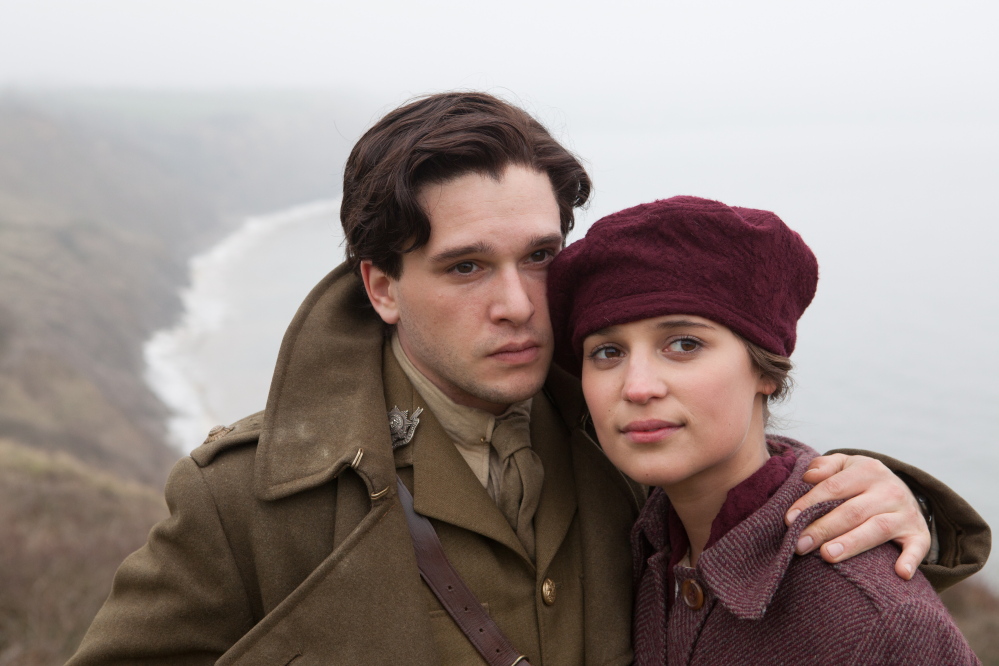“Testament of Youth,” a vivid picture of the horrors and heartbreak of World War I, the Great War, will probably not be the last film story of this time coming to us in the next year. Throughout Europe the centennial commemorations of that terrible war are being held.
“Testament” was the book from young 20-year-old would-be writer Vera Brittain (Alica Vikander “Ex Machina”) whose family, like many others, was torn away from the lovely gardens and peaceful sunsets, tea parties and socials of 1914 when Germany took Britain to war.
When we meet Vera, it is 1918, and the streets are crammed with happy Britons celebrating the armistice. She enters church, where there is a separate cove where women in black huddle in prayer. These are the wives and mothers who have lost many. Slowly, as the film develops, we can understand why young Vera chooses to kneel among them.
Our first moments with Vera are in 1914, when her life is about family and autumn afternoons, swimming in a nearby lake with her brother Edward (Taron Egerton) and his best friend, Victor (Colin Morgan). They are joined by another handsome young man close to Edward, Roland Leighton, a poet and fellow student in his first year with the others at Oxford (Kit Harington, Jon Snow on “Game of Thrones”). It’s a little “Downton Abbey,” a little “A Farewell to Arms.” It’s proper manners now, but it only takes a few moments to know that all of these walkers in the autumn woods are going to be touched by the oncoming war and their lives wrenched from the pastel light and thrown into the approaching fire.
Vera doesn’t want piano lessons and bouquets. She has no need for a husband, she says. She wants to be a writer. There is an uncommon fire in her belly for a girl of the time that won’t be snuffed out. Her well-off parents, (Dominic West of “The Affair” and screen notable Emily Watson) have long had their life’s linen tossed about by the fury of a new age daughter, and decide to accept her plans to enroll at Oxford.
When the men in her life go to France to fight, Vera grows restless and drops away from studies to become a nurse. And here the pastel lights darken to blood red and black pain on the front lines.
The war scenes are some of the best ever shot, one in particular near the end, where the camera cranes up and widens to show acres of stretchers holding the moaning, bleeding wounded and silent dead. Movie buffs have see this before in Ernest Haller’s great shot of the dead and dying in “Gone with the Wind.”
“Testament” is at its core, a love story and a delicate and stirring one. It has all the requisite ingredients: the close-ups of tentative hands touching in a proper chaperoned setting, the startling sudden change of costumes from countryside cottons to blood stained woolens and perfumed breezes of the lakes to the winds of war.
The best scenes are kept for the battle fronts when Vera is forced to clean up the bloody vomit, watch limbs hacked off and spend hours washing the trench dirt from bloody bodies.
A most powerful scene involves a dying German officer who moans his last words that Vera, tutored in Germany as a child, understands. She pretends to be his lover and holds him as he dies. Yes. It’s one of those scenes, and because of the two players, it works.
Director James Kent, a television director and new to the big screen, earns his well deserved praise, and Juliette Towhidi’s script from Vera Brittain’s book maintains its power throughout.
As usual on a film that balances the delicacy of love and war, cinematography is key, and Rob Hardy, who photographed Vikander in “Ex Machina,” earns his money. As testaments go, it’s a touching one.
J.P. Devine is a former stage and screen actor.
Send questions/comments to the editors.



Success. Please wait for the page to reload. If the page does not reload within 5 seconds, please refresh the page.
Enter your email and password to access comments.
Hi, to comment on stories you must . This profile is in addition to your subscription and website login.
Already have a commenting profile? .
Invalid username/password.
Please check your email to confirm and complete your registration.
Only subscribers are eligible to post comments. Please subscribe or login first for digital access. Here’s why.
Use the form below to reset your password. When you've submitted your account email, we will send an email with a reset code.